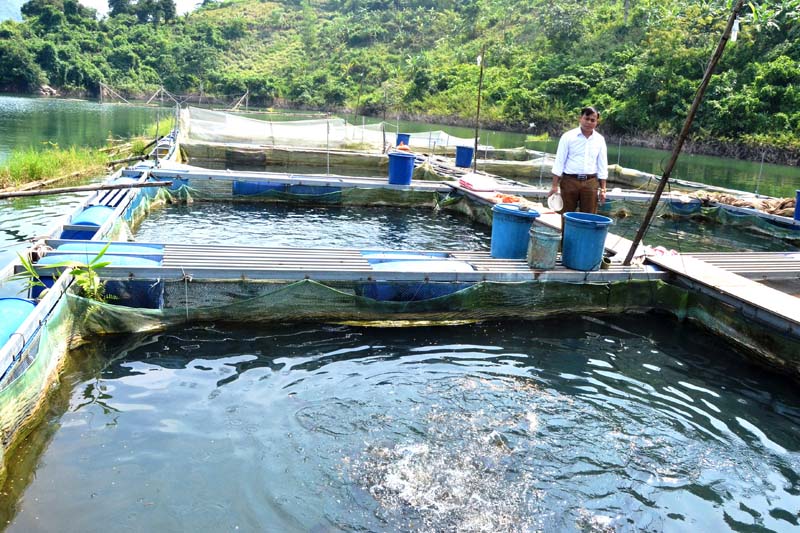
(HBO) - Fish cage farming in the lakeside communes of Hoa Binh Lake in Cao Phong district is becoming an effective direction for economic development, contributing to changing the local people's lives.

Nguyen Xuan Sang's family in Moi village,
Thung Nai Commune (Cao Phong) has expanded to 12 fish cages
According to the statistics, in the whole
Binh Thanh commune, there aree 67 cages of 23 households fishing, in which
Trang village has 20 households and 58 fish cages, accounting for 87% of
households and 86.5% of cages in the commune. It is worth mentioning that among
20 households involved in raising cage fish in Trang village, many of them are
facing difficult economic conditions and belong to poor households. However,
thanks to preferential loans and the provincial and Cao Phong district’s
policies to support the development of fish cage culture, the people in Trang
village has turned the water potential into advantage to develop fish cage
farming on the lake reservoir.
Initially, only the family of Dinh Van Linh
boldly borrowed money to invest in raising commercial fish with some special
fish such as hemibagrus, cranoglanis, pout, and black amurs. After the raising
process, its effect has been seen clearly, many people in the village have
learned and followed. Afterwards, the families of Mr. Nguyen Van Thuy, Mr. Do
Van Thuat, Mr. Bui Manh Thao, Mr. Nguyen Van Linh, etc. and many households in
the village also implemented. Some households carried out with 15 - 20 cages,
for examples: Mr. Dinh Van Linh's family with 12 cages, Mr. Nguyen Van Thuy's
family with 15 cages, Mr. Do Van Thuat's with 8 cages, Mr. Bui Van Tuan with 8
cages, Mr. Le Van Sinh with 16 cages. .
With the job of raising commercial fish
cages, it brings the income from 100-200 million VND to the households each
year. like in Binh Thanh, the local people in the lakeside villages of Hoa Binh
Lake in Thung Nai commune have boldly borrowed capital to develop commercial
cage fish farming with high economic efficiency in the recent years. like the
family of Nguyen Xuan Sang in Moi village, seeing the actual effect brought
about, his family has expanded from the original 3 fish cages to 12 cages with
high value fish. As the consumption has many advantages, after reducing all the
cost, each average fish cage can earn about 20 million VND per year.
Besides Mr. Sang's family, there are
currently 186 fish cages of 68 households in the lakeside villages such as
Tien, Nai and Moi.
Dao Village’s honey – a product certified with a 3-star OCOP (One Commune One Product) rating by Thong Nhat Agricultural Cooperative in Dao Village (Hoa Binh City) – is highly regarded by consumers for its quality, richness, and variety in packaging. The distinctively sweet taste of Dao Village’s honey leaves a lasting impression on anyone who has tried it.
In alignment with Project No. 07-DA/TU, issued by the Hoa Binh provincial Party Committee on November 1, 2021, Lac Thuy district has actively promoted investment and supported the sustainable development of its industrial and handicraft sectors during the 2021–2025 period. Alongside this, the district has remained committed to preserving and revitalising traditional craft villages.
Located in the northern part of Lac Thuy district, with a temperate climate and fertile soil, Phu Thanh commune has great potential and advantages in growing tea. The long-standing experience, combined with strict adherence to organic farming practices in the tea gardens, ensures that the dried tea products from Phu Thanh and Lac Thuy as a whole are sold out immediately upon production, providing a stable and prosperous life for the local people.
Amid efforts to streamline the administrative apparatus, Hoa Binh province has intensified measures to address challenges in land clearance, resettlement support, and infrastructure investment, aiming to speed up the progress of key projects.
Hoa Binh province has posted an unprecedented economic growth rate of 12.76% in the first quarter of 2025, marking its highest quarterly performance to date and positioning it as the second fastest-growing locality in the country, trailing only Bac Giang province.
Under current regulations, products in the One Commune – One Product (OCOP) programme that are rated three stars or higher must undergo re-evaluation every three months. However, in reality, some of these products fail to consistently meet the required standards, raising concerns about the sustainability of their OCOP certification. This underscores the urgent need for producers to enhance product quality and gradually develop their OCOP products into strong, marketable brands.



